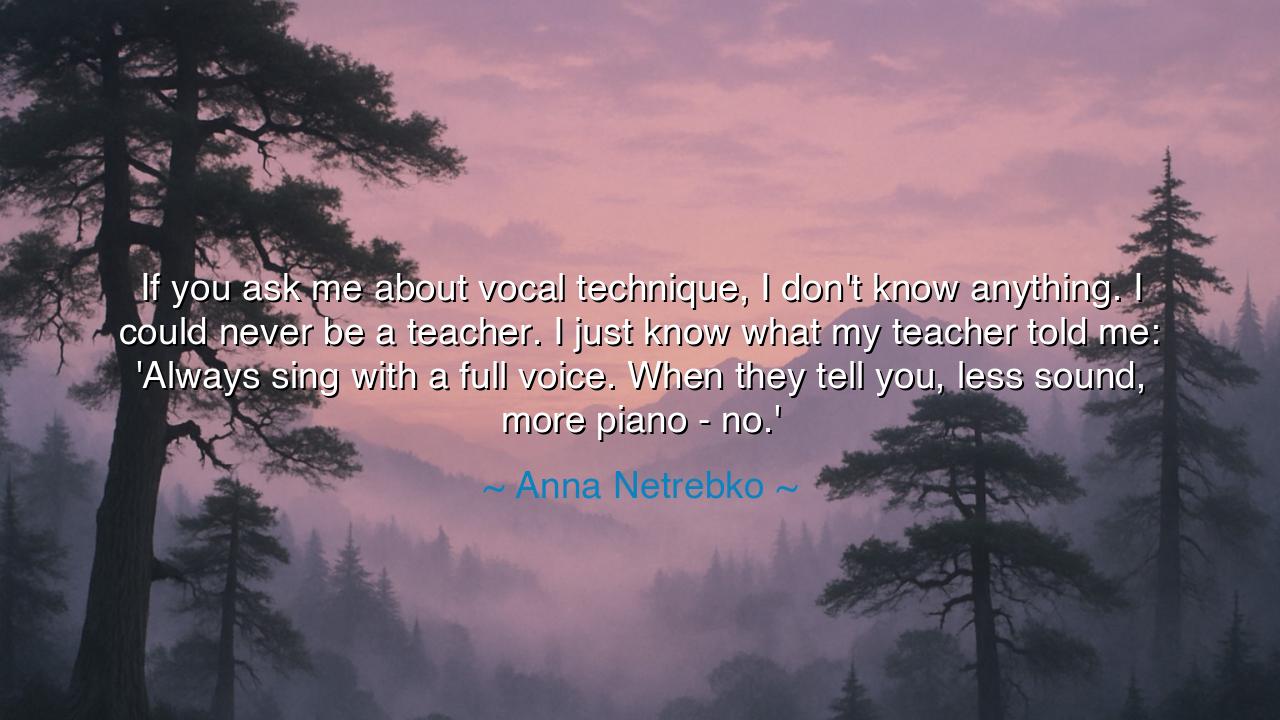
If you ask me about vocal technique, I don't know anything. I
If you ask me about vocal technique, I don't know anything. I could never be a teacher. I just know what my teacher told me: 'Always sing with a full voice. When they tell you, less sound, more piano - no.'






Anna Netrebko, one of the great voices of opera in our time, once confessed: “If you ask me about vocal technique, I don’t know anything. I could never be a teacher. I just know what my teacher told me: ‘Always sing with a full voice. When they tell you, less sound, more piano – no.’” In this disarming statement lies a truth older than the art of music itself: that mastery is not always the child of theory, but of spirit, courage, and the guidance of one trusted mentor. She speaks not of scales, mechanics, or scientific breakdowns of the voice, but of the raw command to pour oneself out fully, to never hold back the fire that burns within.
The origin of these words rests in the tradition of the great singers and artists, who often learned not through books but through imitation, discipline, and the wisdom of masters. In Netrebko’s case, her teacher passed down not a catalog of instructions but a philosophy: sing with fullness, with courage, with no fear of sound. For the voice, when restrained out of timidity, loses its power to move souls. Only when it is given in totality—rich, unbroken, unapologetic—does it carry the strength to awaken hearts. Thus, her lesson is not about technique in the dry sense, but about living art as one lives truth: wholly.
The ancients knew this principle well. Consider the Greek rhapsodes, who recited Homer. They were not taught to measure tone scientifically, but to sing with their whole being, invoking the Muses to carry their words into eternity. Or recall the bards of the Norse and Celtic worlds, whose voices thundered in halls, stirring warriors with the power of sound alone. None of them spoke of “less sound.” They knew that art was a gift of fullness, that to half-sing was to betray both the song and the soul.
History, too, gives us luminous examples. Think of Maria Callas, whose voice was not always the most flawless in technical terms, but who sang with such complete emotion and dramatic intensity that she reshaped opera forever. Callas, like Netrebko, would have understood this teaching: that the voice must not be diminished to please convention, but given entirely, even if it risks imperfection. For audiences do not remember sterile correctness—they remember the moments when the singer’s whole being was carried in the sound.
The meaning of Netrebko’s words, then, is both humble and heroic. She claims she cannot be a teacher, for she lacks the technical formulas. But in truth, she is teaching something greater: that art is not the cautious application of rules, but the fearless offering of self. The “full voice” is not merely volume—it is honesty, strength, courage, and presence. It is the refusal to reduce oneself in the name of safety, and the insistence on bearing the weight of one’s gift without apology.
The lesson for us is profound: in whatever field we labor—whether music, work, or life itself—we must not live half-heartedly. To act with caution alone is to diminish the flame. To live with fullness is to risk more, but it is also to inspire more. The voice of a singer, the voice of a leader, the voice of a soul must not be muted. Even when others demand restraint, timidity, or smallness, the call is the same: give yourself wholly, sing with fullness, live with fire.
Practically, this means rejecting the temptation to hold back. If you are an artist, create with boldness. If you are a thinker, speak your truth without apology. If you are a leader, guide with your full presence. Do not let fear of judgment reduce your voice to a whisper. For in the end, the world is moved not by those who played it safe, but by those who dared to sing with the full voice of their being.
Thus, Netrebko’s words echo like an aria beyond the stage: “Always sing with a full voice.” They are not only a command for singers, but for all souls. Do not diminish yourself. Do not yield to the demand for smallness. Offer your gift, unbroken and fearless, and you will stir not only the ear, but the heart, the spirit, the very marrow of those who listen. For the world is waiting—not for timid whispers, but for the fullness of your song.






AAdministratorAdministrator
Welcome, honored guests. Please leave a comment, we will respond soon